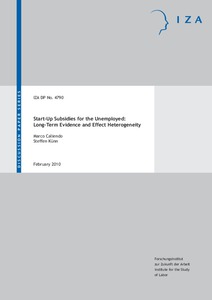Start-up subsidies for the unemployed: long-term evidence and effect heterogeneity
"Turning unemployment into self-employment has become an increasingly important part of active labor market policies (ALMP) in many OECD countries. Germany is a good example where the spending on start-up subsidies for the unemployed accounted for nearly 17% of the total spending on ALMP in 200...
| Main Authors: | , |
|---|---|
| Institution: | ETUI-European Trade Union Institute |
| Format: | TEXT |
| Language: | English |
| Published: |
Bonn
2010
IZA |
| Subjects: | |
| Online Access: | https://www.labourline.org/KENTIKA-19185182124919033649-Start-up-subsidies-for-the-une.htm |
| _version_ | 1771659894681763843 |
|---|---|
| author | Caliendo, Marco Künn, Steffen |
| author_facet | Caliendo, Marco Künn, Steffen |
| collection | Library items |
| description | "Turning unemployment into self-employment has become an increasingly important part of active labor market policies (ALMP) in many OECD countries. Germany is a good example where the spending on start-up subsidies for the unemployed accounted for nearly 17% of the total spending on ALMP in 2004. In contrast to other programs – like vocational training, job creation schemes, or wage subsidies – the empirical evidence on the effectiveness of such schemes is still scarce; especially regarding long-term effects and effect heterogeneity. This paper aims to close this gap. We use administrative and survey data from a large sample of participants in two distinct start-up programs and a control group of unemployed individuals. We find that over 80% of participants are integrated in the labor market and have relatively high labor income five years after start-up. Additionally, participants are much more satisfied with their current occupational situation compared to previous jobs. Based on conditional propensity score matching methods we estimate the long-term effects of the programs against non-participation. Our results show that both programs are effective with respect to income and employment outcomes in the long-run. Moreover, we consider effect heterogeneity with respect to several dimensions and show that start-up subsidies for the unemployed tend to be most effective for disadvantaged groups in the labor market." |
| format | TEXT |
| geographic | Germany |
| id | 19185182124919033649_148a874dd8a94b20b7dc1ee5a6e8ab2e |
| institution | ETUI-European Trade Union Institute |
| is_hierarchy_id | 19185182124919033649_148a874dd8a94b20b7dc1ee5a6e8ab2e |
| is_hierarchy_title | Start-up subsidies for the unemployed: long-term evidence and effect heterogeneity |
| language | English |
| physical | 34 p. Digital |
| publishDate | 2010 |
| publisher | Bonn IZA |
| spellingShingle | Caliendo, Marco Künn, Steffen activation self employment statistics unemployment labour market policy employment subsidy Start-up subsidies for the unemployed: long-term evidence and effect heterogeneity |
| thumbnail | https://www.labourline.org/Image_prev.jpg?Archive=115864693304 |
| title | Start-up subsidies for the unemployed: long-term evidence and effect heterogeneity |
| topic | activation self employment statistics unemployment labour market policy employment subsidy |
| url | https://www.labourline.org/KENTIKA-19185182124919033649-Start-up-subsidies-for-the-une.htm |

